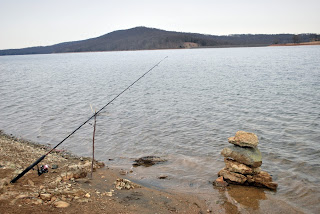 Finally after a winter last year like eternal spring and December this winter season one of the mildest on record, we have ice. Very mild weather is forecast this coming week, but at least today it was really cold out on Lake Hopatcong. It's been so long since we've ice fished, the memories that kept us in the loop year to year were broken, discontinuous and we approached with uncertainty. But Landolfi was on my power auger first thing. It started for the first time and I felt it all come back. We weren't cheated by the mechanical failure possible. Joe cut about a dozen holes finding the ice here out in front besides Nolan's Point was only about four inches thick. So I saw opportunity to use my split bar, venturing out farther and left towards the Point, walking alone in brilliant, snow reflected sun with snaking streams of wind blown powder racing past my feet. Cold scintilated my cheeks so I could feel the blood flow increased to my face and the tingling was a pleasure that made me undividedly present. Rather than being a dead environment inhospitable to life, the world I traversed was wide open including the sun 93 million miles distant, the progenitor of all life, yet intimate with snow hissing as if to alert me to accept its presence instead of ward it off as alien. I paid close attention as powder accumulated deeply along a thick crack that had leaked and a small ridge risen.
Finally after a winter last year like eternal spring and December this winter season one of the mildest on record, we have ice. Very mild weather is forecast this coming week, but at least today it was really cold out on Lake Hopatcong. It's been so long since we've ice fished, the memories that kept us in the loop year to year were broken, discontinuous and we approached with uncertainty. But Landolfi was on my power auger first thing. It started for the first time and I felt it all come back. We weren't cheated by the mechanical failure possible. Joe cut about a dozen holes finding the ice here out in front besides Nolan's Point was only about four inches thick. So I saw opportunity to use my split bar, venturing out farther and left towards the Point, walking alone in brilliant, snow reflected sun with snaking streams of wind blown powder racing past my feet. Cold scintilated my cheeks so I could feel the blood flow increased to my face and the tingling was a pleasure that made me undividedly present. Rather than being a dead environment inhospitable to life, the world I traversed was wide open including the sun 93 million miles distant, the progenitor of all life, yet intimate with snow hissing as if to alert me to accept its presence instead of ward it off as alien. I paid close attention as powder accumulated deeply along a thick crack that had leaked and a small ridge risen.
We fished in front of the green house, home of "The Yeller Woman," who doesn't like people fishing in boats this prime smallmouth bass spot about 30 yards off her bulkhead. No one is home all winter. The plan had been to fish River Styx, but fishing around the corner from Dows Boat Rentals where we bought shiners gave us about 2 1/2 hours to fish. We would have driven at least a half hour around the lake otherwise. A flat extends out from the bulkhead those 30 yards, very shallow, then drops and keeps dropping off to about 45 feet. We set half of our 15 tip ups along this drop off in 10 to 14 foot depths. It's a great musky cruise with the giant predators stalking the length of this edge. Other possibilities included pickerel, largemouth and smallmouth bass. Chances are we didn't fish deep enough for walleye or hybrid bass. The flag on a tip up set about 10 feet deep rose.
"Do you feel it?" Joe said.
"Yeah," Matt said.
"Slow! Pull slow!" Joe said.
Joe snatched the line to feel what Matt had on.
"It's big," he said.
A moment later, it was gone. But for Joe to have said Matt had a big fish on meant it probably was at least four pounds. Who knows. But Joe's a real veteran who once caught a 20 pound tiger musky through the ice. I've caught plenty of three pound pickerel and northern pike that came in easily, that didn't feel "big."
"When you get a flag," Joe said, "You're like a five year old on Christmas morning running to see what's in your stocking."
Arriving upon Bedminster with my son Matt, I said, "I don't like to feel I just live in Bedminster. I like to get out so I feel part of broad horizons." I had just spoken about driving into New England during winter or certainly to Pulaski for steelhead once we get a four wheel drive vehicle. We travel during the warm months and today's outing linked me to New England winters, having experienced them as a boy.
"Yeah!" My son recognized what I meant by broad horizons. "I do too."


















